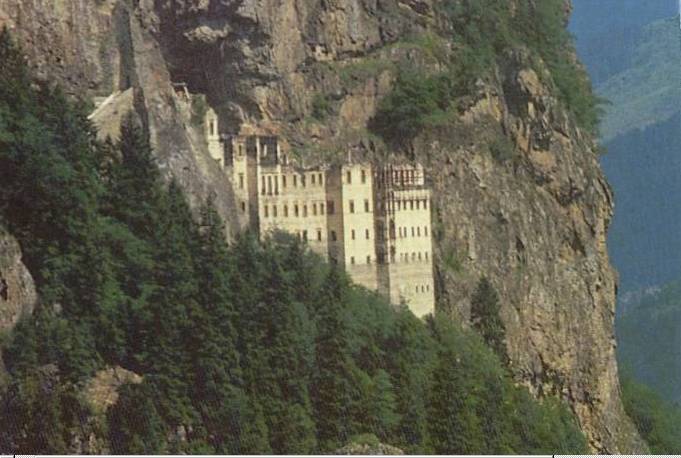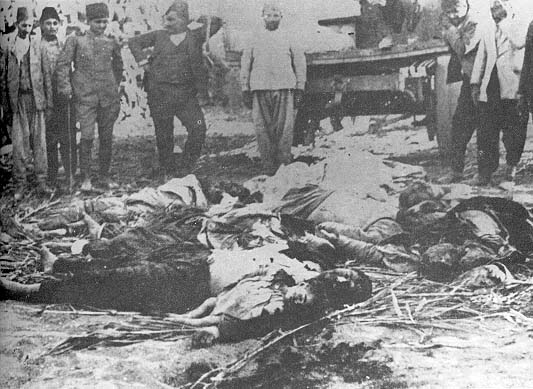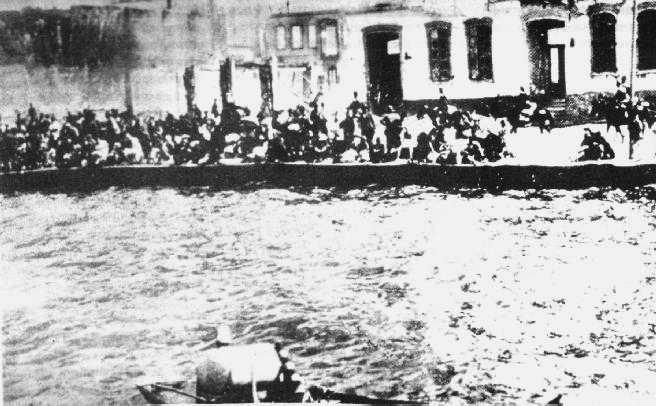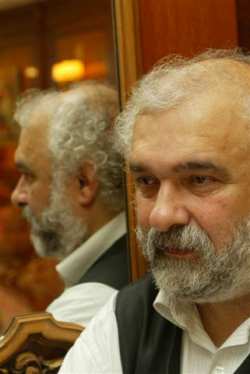|
|
|
|
Three Brave Turkish Writers |
Would you continue writing under threat of imprisonment by your own government? That's precisely what three brave Turkish
writers are doing in order to break the taboos that prevent writers from writing historical facts---not of their Government's
approval. Their stories and names are woven into one another like the threads of a fine Oriental rug.
Rather than fight for their freedom to write from outside their country, they believe that they can only effect change if
they write from within Turkish borders.
For close to 30 years, Ayse and her husband Ragip Zarakolu have been publishing books
acknowledging the Kurds' very existence. Ayse and Ragip's steadfast belief in freedom of expression, their vocal campaign
against the confiscation and banning of their books, and their persistence in publishing works that violate Turkey's
repressive censorship laws, have resulted in innumerable condemnations dating back to the early 1970s.
In 1977, Ayse Nur Zarakolu and her husband Ragip Zarakolu set up the Belge Publishing House from
a basement in
Istanbul,
with a mission to strike down prohibitions and to investigate the rights of minorities in
"democratic" Turkey. The Belge Publishing House (belge meaning documents) operated under a barrage of charges by the Turkish
authorities against Zarakolu and his wife.
Over the years, Ayse's passport was confiscated, preventing her to pick up her award at the book industry's most prestigious
international get-together, The Frankfurt Book Fair, in 1998. Her life had been threatened and she was arrested more than 30
times and imprisoned four times for a total of 15 months. She and her husband Ragip suffered fire bombings of their offices
and presses, the confiscation and destruction of great quantities of their books, and the imposition of heavy fines.
Ayse Nur studied sociology and later became the head librarian at the Institute of Financial Studies at Istanbul University.
She published more than 100 books on the Armenian genocide. Thus, inciting the wrath of Turkish officials. She grew
increasingly determined in her passion for the "right to write." She avowed: "The place to debate our history is in the
books, not in the courts."
She rebounded after her ordeals until her death on January 28, 2001, of cancer at the age of 55. Even after her death,
Turkish officials summoned her to appear in court! After his mother's funeral, her son was arrested because he beckoned the
Kurdish women mourners, whose cause his mother had championed, to carry his mother's casket.
Her husband, Ragip Zarakolu, is a writer and remains the publisher of Belge Publication House.
Ragip. He is currently facing three trials in September, 2005. The Turkish courts accuse him of what he cherishes more than
his own life-his passion for the "right to write" in his own country. Ragip spent a total of two years in prison, some of
it in Turkey's f-style prisons, reputed for their isolation cells. Despite his constant financial struggles, he refuses to
give up. His words resonate, "Whether it's a member of the European Community or not, Turkey must reform. The citizens of
Turkey demand their rights."
The Turkish writer, Omer Asan was born in 1961 in
Trebizond,
 an area with strong Islamic
traditions and with many Greek speaking inhabitants. It is where an aging community still speaks the Pontian language that
is related to Greek. Omer Asan, an economist turned writer, is a Greek-speaking Turk who was driven to write Pontos Kultura
in 1996. He said, "I began to search for my identity because of the fact that the language my ancestors spoke was not
Turkish ... At school they taught us that we were Turks ... but at home, in the village, everyone in the family spoke to
each other in the language we called 'Romaiika'... By asking 'Who am I?' I plunged into the unknown. I had to
find the answer ... I began, in amateur fashion, to collect Pontian words. I decided to focus my research on Erekioi,
my village of Of, [in Trebizond] and to study its living culture as an extant trace of Pontian culture."
an area with strong Islamic
traditions and with many Greek speaking inhabitants. It is where an aging community still speaks the Pontian language that
is related to Greek. Omer Asan, an economist turned writer, is a Greek-speaking Turk who was driven to write Pontos Kultura
in 1996. He said, "I began to search for my identity because of the fact that the language my ancestors spoke was not
Turkish ... At school they taught us that we were Turks ... but at home, in the village, everyone in the family spoke to
each other in the language we called 'Romaiika'... By asking 'Who am I?' I plunged into the unknown. I had to
find the answer ... I began, in amateur fashion, to collect Pontian words. I decided to focus my research on Erekioi,
my village of Of, [in Trebizond] and to study its living culture as an extant trace of Pontian culture."
Originally, Asan's book was published by the Belge Publishing House in Turkey where it met its fate by confiscation and
condemnation and its author was condemned to imprisonment of possibly between 14 months to 4 years. Asan was accused of
being a 'traitor', a 'friend of Greece' and a supporter of those who wanted Orthodox Christianity restored to the chiefly
Islamic Pontian region.
The good news is Omer Asan was acquitted in September 2003 as a result of the abolition of Article 8
of the Anti-Terror Law. His book found a new life when it was published in Greece under its new title, The Civilization of
the Pontos. It became one of the most important books sold in Greece. Its new publishers are Kyriakidis Publishers in
Thessaloniki.
Omer Asan described the traditions of his people from the north eastern part of Turkey
known as Pontos. He vividly described the customs and "forbidden language" spoken only in the home-of traces of an ancient
Greek culture that
 Mustafa Kemal's new "democratic" military government prefers that the world should not know about. By now,
Turkey had hoped that when the survivors are no longer with us that future generations would not know Turkey was originally
inhabited by Greek, Armenian and Assyrian Christians, who were either massacred or forcibly converted into Muslims. Omer
Asan comes from that background.
Mustafa Kemal's new "democratic" military government prefers that the world should not know about. By now,
Turkey had hoped that when the survivors are no longer with us that future generations would not know Turkey was originally
inhabited by Greek, Armenian and Assyrian Christians, who were either massacred or forcibly converted into Muslims. Omer
Asan comes from that background.
Recently in 2005, Ragip Zarakolu published in Istanbul Attila Tuygan's (the Turkish intellectual) translation from English
into Turkish of an Armenian doctor's journal, Garabed Hatcherian: My Smyrna Ordeal of 1922. It has been translated into
nine languages. Its title into Turkish is BIR ERMENI DOKTORUN YASADIKLARI: Garabet Haceryan' in Izmir Guncesi.
Dr. Hatcherian was born in 1876. He held a promising post in Smyrna as general surgeon
and gynecologist at the Armenian National Hospital in Smyrna. To avoid being apprehended by Kemal's troops that had entered
the city, he wore a fez on his head when walking through the streets. Dr. Garabed Hatcherian described in his journal,
"Wednesday, the 13th ...I see a Turk who approached me say, 'We did what was due; you turn back.' The Turk, who obviously
had assumed an active role in the arson, takes me obviously for his compatriot and accomplice and advises me not to advance,
but to turn back. I answer, "Very well," with the attitude of someone who understands the situation and I stop for a moment
to distance myself from the Turk and to avoid conversation...."
In the biographic section of her grandfather's journal, Professor Dora Sakayan, wrote,
"In Smyrna On September 24, 1922,
the Hatcherian family managed to escape to the Greek island of Mitilini, leaving behind
in Akhisar ten members of the extended family on both sides. All ten family members including the mothers and brothers with
their families, were massacred after the occupation of Akhisar [original Greek name was Thyatira 80km/50miles NE of Smyrna]
by the Kemalist army. Another positive outcome of reading the diary was that I was once again filled with gratitude toward Greece, the country of
 my birth, for its humanitarian act of giving shelter, along with thousands of Greeks, to so many Armenian refugees. Among
them was my grandfather with his family who was given the opportunity to restore not only a normal and happy family life,
but also his faith in humanity. Reading the pages of my grandfather's ordeal, I also realized how fortunate we are to be living in a free humanitarian
country like Canada, a country which espouses the humanitarian principles in which my grandfather believed."
my birth, for its humanitarian act of giving shelter, along with thousands of Greeks, to so many Armenian refugees. Among
them was my grandfather with his family who was given the opportunity to restore not only a normal and happy family life,
but also his faith in humanity. Reading the pages of my grandfather's ordeal, I also realized how fortunate we are to be living in a free humanitarian
country like Canada, a country which espouses the humanitarian principles in which my grandfather believed."
As the threads of the Oriental rug weave in and out of the loom, we must question a Government that carried out its
deliberate extermination of all of its original inhabitants, and now is hell-bent on discouraging its writers, lest they
reveal its bloody past. "Out of print" books written 88 years ago by U.S. officials were mysteriously removed from our own
public libraries. Those books only recently have been reprinted and are now available for purchase. They can be downloaded
from the Internet as well. As far back in 1917, the American physician and missionary,
Dr. Clarence Ussher wrote,
"They [the Turks] confiscated my New Standard Dictionary because it contained 'pernicious' words 'liberty and revolution,'
cut out the maps of my Bible because on several of them 'Armenia' was to be found."
Meanwhile, the Turkish Government glorifies its nation's founder as a "man of peace" and continues to use the same methods
concocted during the inception of its founder, Mustafa Kemal, "Ataturk" (Ataturk meaning father of the Turks). It
continues its repressive actions, its human rights violations, and its military intervention to maintain Kemal's vision of a
highly centralized nation state. For having published and distributed in Turkey Dr. Garabed Hatcherian's journal,
Mr. Ragip Zarakolu faces three trials in September 2005, and the possibility of a long brutal prison
sentence. More than four
generations later, Turkey's efforts to quash the truths through denials, distortions, threats, fines, and imprisonments,
must come to an end. World politics aside, the truth cannot be stifled. Although many have raised their voices in opposition
to the tactics of Turkish officials, it is incumbent on world-wide agencies to watch closely Mr. Zarakolu's trials. Until
there is a positive change in Turkey's policies towards its writers, we must speak out against its repressive maneuvers. We
must support these gallant writers who risk their very lives, for freedom of expression. After all, as the late Ayse Nur
Zarakolu so wisely affirmed, "The place to debate our history is in the books, not in the courts."
Ragip Zarakolu's defense speech at his hearing on Sept. 21, 2005 about the accused book titled:
"Experiences of an Armenian Doctor, Garabet Hacerian's Izmir Diary" by Dora Sakayan.
Honorable Members of the Court,
I believe that by publishing Dora Sakayan's grandfather's, Dr. Garabet Hacerian's diary which gives a witness account on the last days of Greek-Turkish war in the city of Izmir I helped an aspect of a historical event to be brought up to daylight. Dora Sakayan is a professor at McGill University, in Montreal, Canada. I was astonished that a case was opened against this book and the Ministry of Justice approved it.
All wars are bad since they devalue human life and dignity. And the biggest victims of all wars are the civilians, the women, the old, the children. The main reason for war legislation and Geneva War convention is to try to make sure that an inhuman event such as war is directed to a humane ground, even at a minimum level. One of the best ways to prevent new civil and other wars is to extend a culture of peace, allowing the lessons of the previous wars to be learned. And that goes for all sides.
Talking about past sufferings, sharing pain helps people to let out painful feelings and go eventually beyond hostilities and understand the other. This brings unity and peace.
Garabet Haceryan was a loyal citizen of his country. Despite all tragic events, he served in Ottoman army and was discharged in 1918. He chose to live in Izmir. He did not panic at the recapturing of the city by the Turkish army. He thought that his medals and documents would help him. But he faced the tragic events, told in the book. We owe him an apology. Publishing this book can be counted as part of that apology. Therefore the accusation that the book insults Turkish national character or the Turkish army is totally unfair. All these events really happened. Banning things will not change anything.
Moreover, the person who is the most responsible for the tragedy that took place in Izmir is Sakally Nurettin Pasha who led a mob to lynch the Izmir Ortodox Metropolit. He declared himself the conqueror of Izmir and tried to profit from it politically. The same person was investigated by the Turkish Parliament for his cruelties during 1921 Kocgiri and Pontus events and his Central Army was dispersed. Ismet Pahsa expressed his disgust at the lynching of journalist Ali Kemal who opposed the liberation war, by Nurettin Pahsa in Yzmit in 1922. Ismet Pasha thought he should have been tried instead.
The indictment is utterly unfair. Dr. Haceryan talks about the atrocities of Greek army, too, as they retreated. The prosecutor claims the opposite. I would ask him to read the book more carefully. Insult and getting information are very different notions but yet can be confused sometimes as this case is an example of this confusion. We, as publishers, were tried with a similar charge for publishing a novel on the same issue 23 years ago in 1982, at Istanbul Martial Law Court. It was a novel by Dido Sotiriyu, titled "Give My Regards to Anatolia," the book had won Abdi Ypekci Turkish-Greek Friendship Award. We were acquitted under the circumstances of the 12 September coup. We took our books back. Later on, Commandership of Land Forces bought 160 copies of that book. Even under the extra ordinary conditions of that time there were many military judges who tried to be loyal to justice and were exiled as a result.
I am asking the court to withdraw the accusation about me which I believe totally unjust.
Ragip Zarakolu
RAGIP ZARAKOLU, A MAN OF VISION.
By Sofia Kontogeorge Kostos
Ragip Zarakolu, the Turkish publisher and writer, once said, "We have to learn from history and avoid denying the past
tragedies, which should cause shame in us. Otherwise, history is bound to repeat itself." He believes that the fight for
freedom of expression can only be accomplished from within Turkish borders and not from the outside.

For thirty years, Ragip Zarakolu owner of the Belge Publishing House has been translating and printing into Turkish, books
that break the barriers of silence instilled by the Turkish Government-the perpetrators of the Genocides of the Greeks,
Armenians and Assyrians of Turkey.
In spite of perpetual harassments Zarakolu perseveres in his struggle, for freedom of expression. With unwavering conviction
he says, "....Not for the Armenians or any others - but for citizens of Turkey." And says,
"We must face these realities to become a real democratic country. We are giving a struggle for this, to give light to
the dark pages of our history."
Over the years:
1. His presses and his publications offices were fire bombed and demolished.
2. He and his late wife were collectively imprisoned for 5 years.
3. Their books were confiscated and banned.
4. He is repeatedly fined and tried.
5. On June 21st, 2006, he faces his eighth trial-with one exception, he must appear in court with a historian whose name remains undisclosed.
If Ragip Zarakolu is found guilty, he faces 13.5 years imprisonment for printing and distributing the Turkish translation
of: Prof. Dr. Dora Sakayan's book is a compilation of her Grandfather's meticulous journals of the heart pounding accounts
of the destruction of Smyrna and his ensuing escape starting from August 28th 1922 and ending in Salonika on June 1st 1923.
Dora Sakayan's book, "An Armenian Doctor in Turkey: Garabed Hatcherian: My Smyrna Ordeal in 1922,"is informative and
compelling and it has been translated into nine languages that include Greek and Turkish.
In George Jerjian's "The Truth Will Set Us Free," he brilliantly and convincingly offers ideas on how Turkey can break out
of its straightjacket of denials in order to create a better future. He includes a surprising and heartwarming introduction
by former Sen. Bob Dole.
In addition to the 39 books regarding the Genocides of the Greeks, Mr. Zarakolu has published books on the Genocides of the
Armenians, Kurds, and of the Massacre of the Jews in Russia. Indeed Ragip Zarakolu is man of vision and a giant amongst us.
Okay, so Turkey continues to summons to court its authors, journalists and publishers and still bans and confiscates books,
and at the same time still hopes to be invited into the open arms of the European Union.
Aside from Ragip Zarakolu, the renowned Turkish publisher and human rights activist, who is currently facing his
7th trial on April 18th, Turkey recently added to their roster of indictments five prominent Turkish journalists?
(1) Murat Belge, (2) Hasan Cemal, (3) Ismet Berkan, (4) Haluk Sahin and (5) Erol Katircioglu.
If convicted they face brutal imprisonment between six months and 10 years. Yet, all these courageous men want is the
freedom to express and to criticize if need be.
Is it chutzpah, thrasos, or audaciousness that makes Turkey think that it will be admitted into the EU with over-zealous
court proceedings? Or is there something else going on under the layers of the harassing multi-trials of its writers? The
Turkish Government must be playing its cards close to its chest because Turkey?s behavior does not make sense for a country
wanting to be admitted into the EU, or does it?
Like a double edged sword, is the Turkish Government hoping that it will not only wear down its writers, journalists and
publishers? but at the same time hopes to discourage future writers on what Turkey terms: "Insulting Turkishness",
"insulting Mustafa Kemal", "insulting its military", or "trying to influence the outcome of a trial".
Questions to ponder: If the present and future voices of dissent can no longer be heard or read in Turkey, does the Turkish
Government think that it will be white washed of how they deal or dealt with its writers? Will the EU be duped?
Sofia Kontogeorge Kostos
Before the Silence
Forgotten Genocides of the 20th Century
Voices of truth
A saint is a person whose own safety is compromised as he struggles to effect a change for a better future. We have such a
saint walking amongst us. Ragip Zarakolu, the eminent Turkish publisher and journalist, has been struggling for
over 30 years on Human Rights issues in his own country. He is the owner and publisher of Belge Publications House.
He and his late wife, Ayse Nur Zarakolu, were imprisoned for 5 years - their presses and offices were bombed, their books were
banned and confiscated, and were excessively fined. Yet Ragip's struggle for Freedom of Expression and Freedom of Thought
continues.
More recently, Ragip Zarakolu finds himself in the middle of another legal storm for publishing these two illuminating
books: ~ I read these two books and highly recommend them.
1. An Armenian Doctor in Turkey: Garabed Hatcherian: My Smyrna Ordeal of 1922, Prof. Dora Sakayan, 1997
(Translated into 8 languages & into Turkish)
2. The Truth Will Set Us Free, George Jerjian, 2003
(Introduction by former U.S. Senator Bob Dole.)
Mr. Zarakolu's 8th trial on June 21st, 2006 must not go unnoticed. Recently, when I spoke to Mr. Zarakolu by telephone, I
asked him why he continues his struggle in the face of so much uncertainty. He answered softly, "I am not a Saint,
I am a simple man who misses peace, Ruhe, [German] spiritual and in the world, between the people...
I only try to be righteous, juste [French].... After seeing the truth, the reality, and learning the sufferings of human
beings, without separation on the base of belief, ethnic or political views. I am on the side of free thinking and
non-national points of view. I love the peoples, we share the earth and Anatolia, where they were born. Without separating
Greek, Armenian, Kurdish, Assyrian, Jew, or Others...It was our duty, what we did, which was not enough... I try only
for continuation of Ayse Nur's struggle that she initiated courageously Nur [Turkish] means The Light..."
Freedom of expression is NOT alive and well for writers in Turkey. The underlying cause is explained by the bestselling
Turkish author Elif Shafak who said, "In my country there is a clash of opinions between those who want Turkey to join
the EU and to become a more open society and those who want to keep Turkey as an insular, xenophobic, nationalist and
closed society." Adding she said, "They deliberately want to stop the process.
This in no way reflects the society in this country."
 The 35 year old author Elif Shafak could serve three years in jail for remarks made by a fictional character in her latest
book, "The Bastard of Istanbul". Charges were brought against her publisher Semi Sokmen and her translator Asli Bican as
well - all three were charged for - "insulting Turkishness". Shafak wrote her book in English which was later translated
into Turkish. 50,000 copies have been sold in Turkey since its publication in March 2006. The English edition will be
published by Viking Penguin and is due to come out January 2007. The charges were dropped on the grounds that the
characters in her book are fictional, therefore cannot be tried.
The 35 year old author Elif Shafak could serve three years in jail for remarks made by a fictional character in her latest
book, "The Bastard of Istanbul". Charges were brought against her publisher Semi Sokmen and her translator Asli Bican as
well - all three were charged for - "insulting Turkishness". Shafak wrote her book in English which was later translated
into Turkish. 50,000 copies have been sold in Turkey since its publication in March 2006. The English edition will be
published by Viking Penguin and is due to come out January 2007. The charges were dropped on the grounds that the
characters in her book are fictional, therefore cannot be tried.
In Turkey, "The Bastard of Istanbul" sold more than 50,000 copies and became a bestseller for three months. Overall the
reception of the book was positive, both in the media and society.
Her novel is about four generations of women, moving between Turkey and the US: It tells the story of an Armenian family
and the descendants of a son left behind during the deportations who converts to Islam and lives as a Turk.
Instead of enjoying her book's success, Shafak must face a long legal battle. In June 2006, an ultra-right wing lawyer,
Kemal Kerincsiz, filed charges to reopen the case against Shafak using as evidence an Armenian character in Shafak's book
that says, "I am the grandchild of genocide survivors who lost all their relatives in the hands of Turkish butchers in
1915, but I myself have been brainwashed to deny the genocide because I was raised by some Turk named Mustapha! What kind
of joke is that?."
Kerincsiz and others like him (aka the Kemalist elite), consider it a crime to allude to anything that has to do with
genocides of the Armenians. After 90 years, Turkish officials vehemently continue to stifle the truth by whatever means
possible. For over a period of 28 years, Turkish authorities organized and carried out the systematic butchery of the
original inhabitants of Turkey (Asia Minor), not only of the Armenians, but also of the Greeks and the Assyrians.
Back in 1922 headlines throughout the world blared: "Turks will be Turks" "The Unspeakable Turk" "Turkish Savagery"
"Turkish atrocities" "Turkish Outrage" "Turkish Misrule." It is people like the brave Turkish writers and publishers who
by exposing the painful truth of their country's past also bring comfort to the wounded psyches of the Armenian, Greek and
Assyrians families.
Shafak must reappear in court in September 21st which coincides with the birth of her first child.
The enlightened and beautiful Elif Shafak was born in France and spent her teen years in Spain. She later studied social
sciences in Turkey. By 2002 she moved to the US. She earned her PhD degree in political science. She has spent one year at
the University of Michigan, and later held a position as assistant professor at the University of Arizona. Lately,
she went on tour through the USA and Turkey to promote her newest novel.
Ragip Zarakolou, Turkish President of the Publishers' Association, who will be facing his ninth trial for
"insulting Turkishness" on October 9th 2006, with the threat of 13.6 years imprisonment, stated that works like Shafak's
are gaining a wider readership because more Turks are seeking to explore Turkey's past. Publisher Zarakolu's two
books that "insulted Turkishness" are:
An Armenian Doctor in Turkey Garabed Hatcherian: My Smyrna Ordeal of 1922, by Dora Sakayan,
and The Truth Will Set Us Free by George Jerjian.
We can show our support for Elif Shafak, by buying The Bastard of Istanbul, and by buying the books of other brave Turkish
authors and publishers as well.